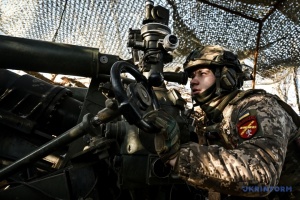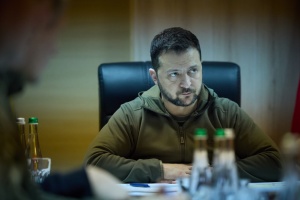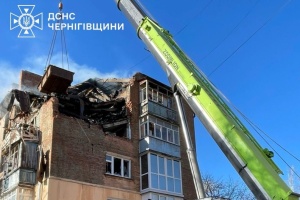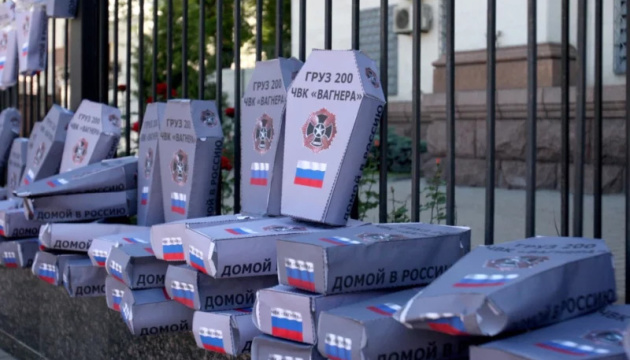
The End of Putin’s Cannon Fodder: A Digest of Russian Propaganda as of December 2-4
The Center for Strategic Communication and Information Security has collected the main fake news stories and Russian propaganda narratives for December 2-4.
- Wagner in Bakhmut, on TikTok and in Washington
- Moscow gets kicked out of a key market
- Russia’s “paid friends” in Europe
- From domestic abuse to “capturing Kyiv in three days”
Wagner in Bakhmut, on TikTok and in Washington
Against the backdrop of heavy fighting near Bakhmut, which, we should point out, is currently being waged not by the Russian armed forces, but actually by mercenaries from the Wagner PMC, the head of the Office of the President of Ukraine, Andrii Yermak, explained how it is taking place on the Russian side.
“They are taken to positions like cannon fodder, without weapons. Then, so-called ‘camels’ deliver weapons right before an order to advance. They get a machine gun, without armour or helmets, and raid our positions.
This is what happens every day near Bakhmut. They sacrifice hundreds of such people in hopes they will be able to weaken our defence.
Nothing changes in the horde. People there have always been cannon fodder, and it won’t change until they start fighting back,” writes Yermak.
This cannon fodder supplier has finally garnered some attention worldwide.
The US State Department included Wagner PMC in the list of entities of concern.
The list also includes other terrorist organizations, such as al-Shabab, Boko Haram, Hayat Tahrir al-Sham, the Houthis, ISIS-Greater Sahara, ISIS-West Africa, and the Taliban.
Earlier, on December 1, the US Congress presented a bipartisan draft law on recognizing the Russian PMC as a terrorist organization. According to this document, any groups affiliated with Wagner PMC or its “successors” will also be declared terrorist organizations.
IN FACT, in parallel, the Wagner ad is actively disseminated on TikTok, having already amassed over a billion views. NewsGuard analysts have found over 160 videos depicting or demonstrating violence and glorifying the PMC. Over 500 videos were also found with calls to kill Ukrainian “Nazis.”
TikTok’s algorithms fed users violent content related to the PMC. For example, when searching for Wagner in English and Russian, the videos “Wagner’s punishment,” “Wagner’s sledgehammer” and “Wagner’s orchestra” were offered.
Following the publication of the NewsGuard report, TikTok’s administration said it had conducted a clean-up. Many of the videos cited by analysts have been removed from the platform.
Comparing Wagner with ISIS makes a lot of sense. Terrorists have no nationality. Even though the former are allegedly fighting the latter. One of the “Wagnerite” videos on TikTok demonstrate a mercenary in the desert waving a flag that says “Hunters for ISIS.”
“Wagner recruiters are already liberating prisoners from the Central African Republic prisons and transporting them to the east of Ukraine,” reported two high-ranking officers of the CAR to The Daily Beast.
“The Wagnerites also liberated those imprisoned for rape of women and girls… I think more than 20 people we’ve been holding [for very serious crimes] have been released,” said one of the officers.
So apparently, Putin’s own cannon fodder is no longer enough.
Moscow gets kicked out of a key market
As expected, Russian officials had a big meltdown following EU countries introducing the price cap on oil at USD 60 per barrel, which comes into effect on December 5. Kremlin press secretary Peskov said that “Moscow will not accept this,” and, according to Russia’s permanent rep in international organizations in Vienna Ulyanov, “Now, Europe will live without Russian oil.”
Deputy Secretary of the Security Council of the Russian Federation Medvedev responded to Europe’s decision on restrictions on raw materials from Russia with a frame from The Shining, captioning it with the phrase “Finally, we have decided on price caps for Russian oil.”
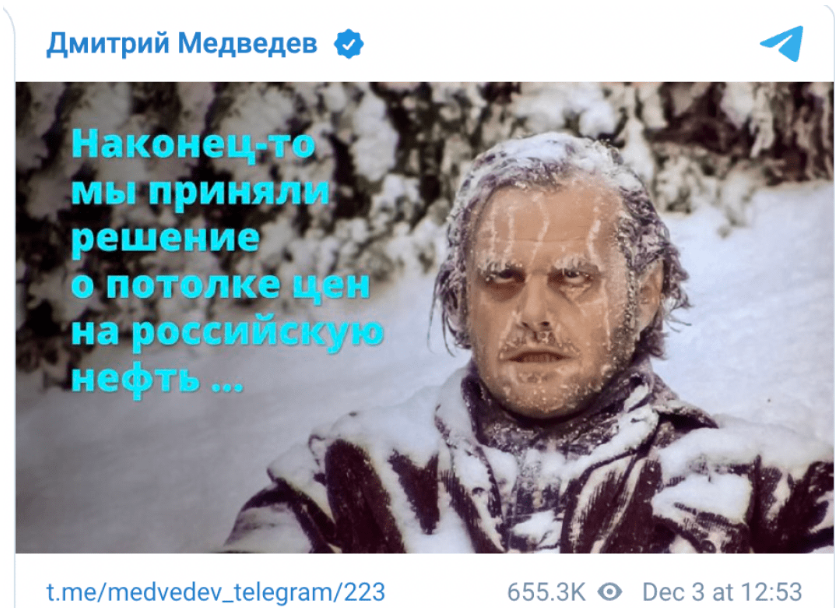
IN FACT, it is not news that Medvedev and other Kremlin dwellers have long been living based on Stephen King’s line from The Shining: “We live to fight every new day.”
So today, Moscow is suicidally rejoicing that it has been essentially kicked out of the key European market. Other markets, primarily Asia, on which Russia places high hopes, are not very promising. And the important reason is infrastructure shortcomings. Everything that Moscow uses today was made over decades during the USSR times and exclusively aimed at Europe.
Russia will not be able to reverse the oil flows fast enough. Though for some time propaganda may well claim that “there are many buyers worldwide, let Europe freeze.”
Russia currently supplies about 3.5 million barrels a day, and a full Western embargo could cut that supply by about a third, and not just to the G7 countries. The ban applies not only and not so much to the purchase of oil and oil products (since February 5) in Russia, but also to the transportation, financing, and insurance of any deliveries by sea to any country.
Russia will not be able to immediately find an alternative to London insurers, Swiss traders and Greek tankers, which will inevitably affect the volume of exports, and in the future — oil production in the country.
Experts are already predicting that the drop in oil production in Russia will amount to at least 1 million barrels per day. And these are optimistic estimates. Pessimistic ones estimate the decline at 2.5–2.7 million barrels per day since the beginning of March next year. Plus, there’s the price factor, which is already lower than the price cap. Add the discounts reaching 40%. Add an increase in the freight cost of vessels for the transportation of oil. (Russia is now actively buying up old oil tankers, but this is before the first serious accident with a large-scale spill, which will lead to an environmental disaster).
In essence, these are already hidden reparations and contributions, which Russia is beginning to pay even before the formal capitulation in the war with Ukraine.
Russia’s “paid friends” in Europe
Of course, Western “friends,” who have long been paid by the Kremlin, will play a big role in promoting the narrative about “frozen Europe, which will soon come to Russia on its knees.”
In this regard, a decision of the Higher Regional Court in Hamburg regarding the member of the right-wing party “Alternative for Germany” (AfD) Beatrix von Storch looks interesting; it became known on December 3.
It turned out that she maintained contacts with the Russian far-right oligarch Malofeyev and received a donation of EUR 75,000 from him for her association “Marriage. Family. Life.”
Andreas Audretsch, a politician from the Green Party, reported about von Storch’s connections back in September. He expressed the opinion that the AfD does not uselessly “spread Putin’s propaganda in the Bundestag, and if anti-democrats with a lot of money gain influence in Germany, it is necessary to speak about it openly.”
For these words, the association “Marriage. Family. Life” sued Audretsch for defamation. However, after examining the evidence submitted by the latter, the court ruled that his words were not defamation, but a statement of real facts.
IN FACT, the presence of Russian “friends for money” in the world is no longer a secret. And it’s not about some convicted marine sex offender Scott Ritter doing his own propaganda shows in Russia, it’s about real politicians. Even if they are from another echelon.
The same Beatrix von Storch is the deputy head of the AfD faction in the Bundestag.
Let us remind you that the EU Parliament has recently officially recognized Russia as a sponsor of terrorism. 60 out of 705 MEPs opposed such a step. According to the publication “Polygon Media” together with “We can explain,” their decisions had both ideological and financial reasons.
Many of these MPs have long participated in the “democratic plays,” staged by Moscow, at the expense of the Russian budget.
For the most part, MPs from the same Alternative for Germany and the National Rally voted against the European Parliament resolution.
Among the supporters of the Kremlin is Frenchwoman Aurélia Beigneux. In 2020, she was among the “experts” who observed the vote on amendments to the Constitution of the Russia. The visit was organized and fully paid for by the Public Chamber of Russia.
The same “plebiscite” was observed by the MP from the “National Rally” Catherine Griset, the ex-assistant to Marine Le Pen. She flew to Moscow in the same business class as Beigneux, both lived in Raddison, both noticed no irregularities in the “voting.”
Moscow was also supported by the Alternative for Germany MP Gunnar Beck. He flew to observe the elections to the State Duma-2021 at the personal invitation of the Speaker of the State Duma Volodin.
Among the supporters of the “Russian democracy” was Miroslav Radačovský from the “Patriot of Slovakia” party. In September 2021, he participated in the Moscow scientific and practical conference “The role of civil society in ensuring democratic standards of organization and conduct of elections,” which was also organized by the Public Chamber of Russia. His flight and accommodation at the Radisson Slavyanskaya hotel were paid for. He also voted against the European Parliament’s resolution.
From domestic abuse to “capturing Kyiv in three days”
Last but not least, let’s talk about “marriage, family, and life,” but in the context of the Russian-Ukrainian war.
Svitlana Chunikhina, Vice President of the Association of Political Psychologists of Ukraine, Senior Researcher of the Institute of Social and Political Psychology of the National Academy of Psychological Sciences of Ukraine, noticed that when describing the dynamics of relations between Ukrainians and Russia through the metaphor of interpersonal relations, the closest analogy is a family abuse.
IN FACT, men who seek total control, and then inevitably move on to direct violence against wives, use a typical set of arguments:
You owe me everything, without me, you are nothing (“Lenin created Ukraine”)
Who needs you?.. (“Russia is Ukraine’s sister, and the West only wants to exploit us)
I did everything you wanted me to do, and you betrayed me (“out of kindness they sold gas cheaply”)
You yourself are asking for it (“wanted to join NATO and the European Union”)
If you do not listen to me, you will regret (“enter into negotiations; otherwise we will plunge you into darkness, cold, and hunger”)
You will not receive custody over children (forcible deportation of children from Ukraine).
READ ALSO: Putin’s war against Ukrainian children
“This analogy is vulgar, but at a certain level, it works flawlessly…” Chunikhina believes.
“In Russia, beatings within a family were decriminalized in 2017, just halfway from the annexation of Crimea to the bombing of Kyiv. If there was a moment when Putin finally decided on a great war, then it is likely then.
And it is not that the acceptable level of violence in society against women triggers the gears of war. Rather, letting husbands beat wives is an unmistakable and unambiguous indicator that society perceives the disparity of power (some people against others) as the basis of the social order.
Society falls in love with power, with a sense of belonging to the dominant force, revels in its imaginary power.
The idea of “taking Kyiv in three days” is completely a product of the syndrome of love enchantment with its own strength. And the total support of the Russians for the war grows from these roots — we fight because we are stronger.
Lundy Bancroft, a renowned male abuse researcher, wrote a whole book about how domestic tyrants “do this” not out of fear of losing a loved one, not because of childhood trauma and frustration, not because they can’t communicate with other people otherwise than in a language of violence. They do so simply because they can (“the weak are beaten,” as Putin said in 2004).
Because they are confident of their power and advantage — social and, ultimately, existential one. Because they think that there will be no resistance and punishment (this is a matter of the family, this is an area of special interests of Russia).
Here are all the psychological prerequisites of violence — force disparity.
Therefore, after this war, people of good will should be concerned not only with the creation of mechanisms that prevent the stirring of force and violence in one point or another on the planet, but also with ways to avoid the emergence of security vacuums, catastrophic weakening of some societies against the background of neighbors. Such disparity threatens not only the local region, but the world as a whole.


